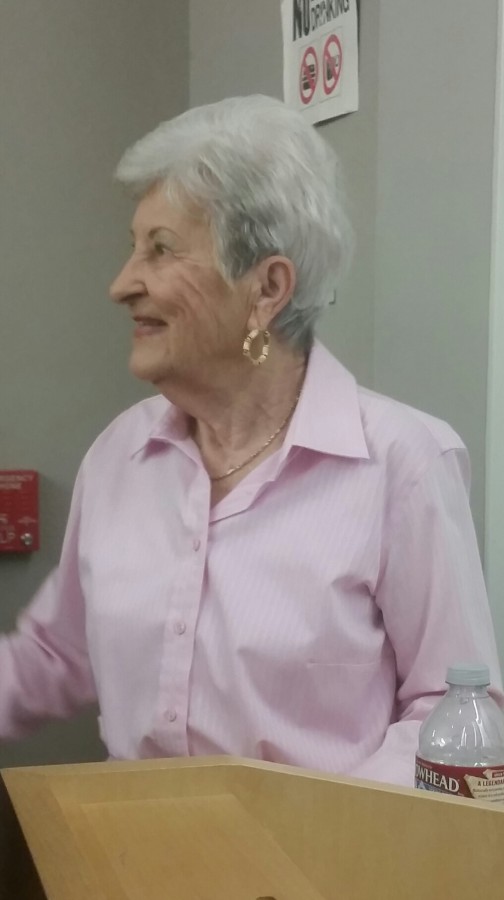Top-selling author John Green wrote, “Last words are always harder to remember when no one knows that someone is about to die.”
For 85 year old holocaust survivor Rose Schindler, her father’s last words remain burned into her memory.
“The last words my father ever said to me and my siblings,” she recalls, “Was ‘No matter what you do, stay together. And stay alive so you can tell the world what they are doing to us.’”
Schindler recalls her very “primitive but beautiful” childhood as a young Jewish girl born and raised in a small town in Seredne, Czechoslavakia. She lived with her seven other siblings and her parents. She recalls living in a tiny house with no electricity or running water.
“Believe it or not, we were happy living so primitively,” she grinned, “When you don’t have that much, there isn’t much to miss.”
In 1938 Hungary and Germany began their invasion of Czechoslavakia. Rose recalls many restrictions being placed on Jews, including children no longer being able to attend school. Soon, many Jewish businesses and markets were taken away and given to non-Jews.
“They took my father’s tailoring business away and sent him to do hard slave labor outside of town,” Rose recalls, “He used to come home late at night beaten and battered.”
In April of 1944, one day after passover, Rose recalls a dozen german soldiers marching into her town and announcing that all Jews would be transported. “Take what you can bring. If you have any valuables, hand them to us and they will be returned to you when you come back.” they said.
Rose recalls being crammed into cattle trains with thousands of other Jewish families as they were being transported to an unknown destination.
“The journey was only a couple of days but it felt like an eternity,” she recalls, “There were no bathrooms, no food or water, no windows, no seats– I mean, you could have passed out from the stench alone.”
When the train arrived at Auschwitz, a Jewish officer who helped Rose off the train inquired her age. “I told him I was fourteen,” she states, “And he looked at me and said ‘Tell them you are eighteen so you might have a chance to survive’.”
After everyone had been unloaded from the cattle train, they were instructed to stand in three lines. One line included men and boys strong enough to work or fight. The second line included women who refused to give up their younger children, the sick, the weak, and the elderly. And the third line included more women who were self sustained or independent. When the SS officer asked Rose what her age was, she stated she was eighteen, just as she had been instructed.
“I was very firm when I told that officer I was eighteen. I said it very courageously for a fourteen year old,” she recalls, “And it was a good thing too, because he sent me into the third line.”
The second line where Rose’s mother, her two younger sisters, and her younger brother stood led straight to the gas chambers.
“I remember hearing the screams from the fire,” Rose stated, “It was so horrible. They didn’t even give the people enough gas to kill them. They would push these half-living people out of the chambers and cremate them alive.”
Helen at 21, Judy at 19, and Rose at 14 were left all alone to defend for themselves. Rose recalls that her stay at Auschwitz was the worst time of her entire life.
“I was a scavenger,” she says, “I used to sneak into the back of the kitchen and steal any rotten food I saw. I was very fearless, because that’s what it took to survive. You had to have guts. If you gave up, you didn’t make it.”
And many women did not make it. They would grow ill from the food, or die from starvation. Rose recalls many Jewish women who would run their hands along the electric wired fence to put themselves out of their misery.
“You would just hear them scream,” she said, “They would put their hands on this fence and scream. And within twenty seconds, there would be blood coming out of their noses and they would be lying dead on the floor.”
Auschwitz was a transitional camp. The people who were sent to Auschwitz often did not stay very long, because they were either killed or deemed suitable to be sent off for work.
Because Rose was all skin and bones, she was always selected to be put into the “gas” line. She was quick and escaped into the “safe” line beside her sisters many times. Her sisters were always chosen to be shipped off to work, but they never wanted to go because they never wanted to leave Rose behind.
“One day when they were selecting women to go to work, I told my sister Helen to save me a spot. Because I knew that if we didn’t make it out, we would die there in Auschwitz.” She recalls, “I ran for my life and made it barely to be sent off with my sisters to Brunnental, an ammunition factory.”
Life after Auschwitz was a lot better for all three girls. Rose states that they fed them a lot better, because they needed them to be healthy for labor. The girls worked tirelessly at the factory until the morning of May 6, when Russian soldiers came to liberate them.
After the war, people changed. “It was like the world was coming together to save me,” Rose stated, “But where was the world when this first started? I just don’t understand why it took so long.”
It wasn’t easy for Rose to assimilate back into her life. Everything and everyone had changed. When the girls returned to their town, they asked their neighbors to give back some of their old things, and the neighbors simply stated, “If you want to live, you should leave. Or else I’ll finish the job that Hitler started.”
The girls got news from a fellow soldier that their father had gotten ill, so he was shot and left to die on the battlefield. Their older brother was taken out to a field where he was told he was digging graves for the deceased, but then he was shot execution style and fell to his own grave.
One of the hardest things was to talk about the past. Schindler has overcome much more than anyone could even imagine. She continues to inspire others with her story, because although she has gone through so much pain, she remains hopeful for a better future for her children and grandchildren.
“Every story is special,” Schildler states, “But I want to share my story, just as I promised my father, so the world will always remember and those who are gone will never be forgotten.”


